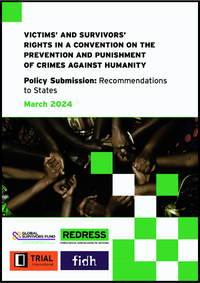Publications
REDRESS’ publications are also available in hard copy format. Please contact us for further information on [email protected].
Freedom from Torture and REDRESS wrote to PM Rishi Sunak urgently requesting to ensure that any intelligence provided by the Israeli authorities used by the UK to inform its response to this crisis has not been obtained by torture or other ill-treatment.
A joint civil statement from Egyptian and International human rights organisations calling on Egyptian authorities to immediately and unconditionally release Mahmoud Hussein who is facing 25 years in prison for wearing a t-shirt with an anti-torture slogan.
Over the last decade, the International Law Commission and the UN General Assembly have made progress in attempts to establish a Convention on Crimes Against Humanity (CAH). In this policy brief on a prospective CAH Convention, REDRESS, the International Federation for Human rights (FIDH), Global Survivors Fund (GSF) and TRIAL International voice support for a prospective CAH convention. This Convention can cement Customary International Law and fill an important existing gap in treaty law regarding crimes against humanity. The policy brief makes recommendations to States on reflecting progressive provisions on victims’ and survivors’ rights in a prospective CAH Convention
This Practice Note aims to facilitate the understanding and practice of a survivor-centred approach to strategic human rights litigation and reparation claims. It is based on REDRESS’ experience, desktop research, and consultations carried out with 12 practitioners from international and national organisations with vast experience in supporting survivors in obtaining reparation in different regions. While this Practice Note provides useful guidance based on experience to date, it is important to acknowledge that practices in this area are constantly evolving.
This Practice Note is aimed at facilitating the understanding of reparation and its many facets, principles, and standards. It provides practical and comparative examples related to claiming and accessing reparations in different contexts in a survivor-centred manner, and proposes strategies to overcome obstacles in the journey towards reparation. This Practice Note is complemented by REDRESS Practice Notes on Claiming and Implementing Reparation, Survivors Centred Approach, and Compensation.
REDRESS' submission to the UN Human Rights Committee's review of the UK's compliance with the International Covenant on Civil and Political Rights (ICCPR). The submission focuses on three key issues raised in the UN’s List of Issues prior to the submission of the eighth periodic report. The first addresses the criminalisation of torture, emphasizing the need for universal jurisdiction. The second highlights the UK's involvement in torture and rendition, urging a prompt and impartial investigation into allegations of collusion. The third underscores the importance of non-refoulement, expressing grave concerns about recent legislative developments, particularly the Illegal Migration Act 2023 and the proposed Safety of Rwanda (Asylum and Immigration) Bill.
Evidence submitted by REDRESS to the Joint Committee on Human Rights' Inquiry on the Safety of Rwanda Bill.
This briefing provides an overview of recent developments in the UK’s use of targeted sanctions as of 23 January 2024.









